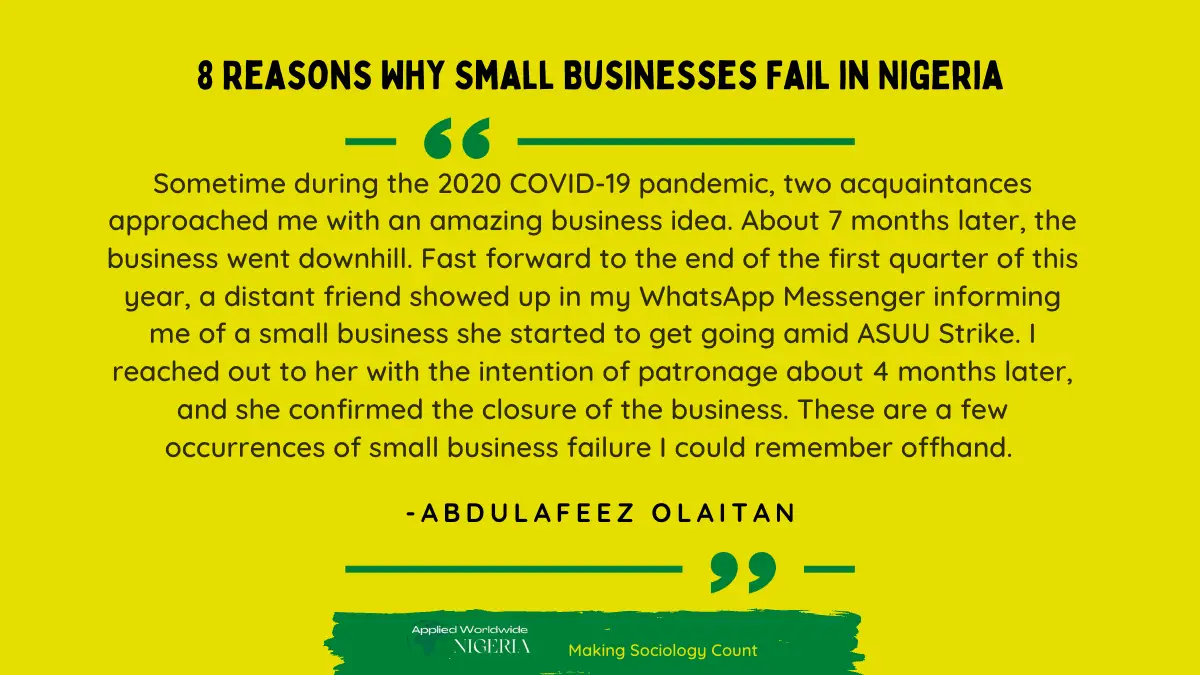Sometime during the 2020 COVID-19 pandemic, two acquaintances approached me with an amazing business idea. About 7 months later, the business went downhill. Fast forward to the end of the first quarter of this year, a distant friend showed up in my WhatsApp Messenger informing me of a small business she started to get going amid ASUU Strike. I reached out to her with the intention of patronage about 4 months later, and she confirmed the closure of the business. These are a few occurrences of small business failure I could remember offhand. I showed great empathy to both my acquaintances and distant friend over the sad turn of events and began backtracking to discover a pattern leading to why small businesses fail.

Although Nigeria is home to a significantly high number of small-scale businesses, you will find the number of short-lived businesses in the country quite alarming despite the contribution of SMEs to the economy and national development. It is important for you to understand the reasons why a small business or startup may fail in Nigeria. This article will help you understand what not to do in your journey toward entrepreneurship.
Some of the reasons why small businesses fail in Nigeria are listed below;
1. Lack of ideation and research
Your business venture requires an ideation stage. At this stage, you bring your business idea to a physical concept. Ideation gives room for the synthesis of your ideas and the lack of it ensures the peril of your small business or startup before it is even given the chance to grow. Research should be the backbone and stronghold of your startup business. It is the framework upon which your young business venture relies. Good research gives you a good output of what is to be done and how it is to be done.
Inadequate research on the other hand will prevent your business from reaching its target. You should investigate the market well enough before deciding to venture into your business idea to avoid failure.
2. Business outline problems
A solid and realistic business outline is expected to contain the goals of the business, the methods for attaining the goals, and the time frame for the achievement of the goals. It is the basis of a successful business.
You should outline achievable goals for your business, how your business can meet those goals, and possible problems and solutions. If you don’t put together the formal written document containing the aforementioned, your startup business may fail because it is this outline that helps you figure out if there is a need for more research, survey or interview.
It also helps you know the costs and inputs needed for your business, and strategies that you should implement and meet. Once you have carefully laid out a plan, then you must follow it. Also, your outline should properly specify the Key Performance Indicators (KPIs) in your startup. It helps you instill a growth mindset quite rapidly. Not clearly making sure KPIs are explicitly stated often results in a downturn for many businesses.
3. Wrong investment decisions
When you make the wrong investment decisions, you may be unleashing havoc on your business venture. This is because these decisions are very important to the future success of your business.
One example of a wrong investment decision is using short term funds to finance long-term projects. You should avoid this at all costs.
4. Disregard for competition
If you don’t put competition into consideration, you are placing your startup in a position of peril. Some business ventures just want to do the same thing the next business is doing without any more creativity to it. This usually has proven fatal for small businesses and startups.
You should not fail to differentiate your products and services in a highly competitive environment because of the strong bargaining power of consumers.
5. Poor record keeping and accounting practices
If you are a small business owner, then you should take record keeping seriously. It includes sound accounting practices, as well as operational records which usually help to facilitate the decision-making process.
6. Failure to adopt modern technologies
This is the era of globalization, so, you should embrace modern digital media technology in order to move your startup business forward and bring your products and services closer to potential consumers. If you do not embrace e-commerce or adopt new technologies faster, you stand a risk of business failure.
Low or no online visibility could mean bad for your business because the drastic increase in the social media presence of startups is a passive form of digital marketing which affords you to reach a greater, wider audience.
7. Inconsistency of operations
Inconsistency of operations is another factor that could lead to the collapse of an otherwise thriving business. For example, if your small business or startup is taking the shape of a ‘jack of all trades, but master of none,’ then it risks collapse. When you venture into just about any business endeavor at sight, you will need more than sheer luck to succeed, especially in a country like Nigeria. At the same time, poor planning, strategizing, and prioritizing could do more harm to your business in areas of financial planning, management planning, or sales and marketing planning.
8. Poor decision making process
The success of your startup venture is a combination of many factors. This may include but is not limited to the proper harnessing of your various resources to achieve the desired ends. Although these resources can be human and/or non-human resources, it pays to realize that they are ideally required for a proper mix of sustainable growth and development. At the center of such are the process of decision-making and its implementation.
In most small-scale businesses, business decisions are made by only one person without any other person involved in the process. Such a person becomes an expert on every issue and this is far from reality. If there are no business partners in sight, then you should conduct a proper interview or survey to understand the momentary business needs and services you aim to cater to so as to make better business decisions.
Now go into your small business venture, and fail no more. Godspeed.






